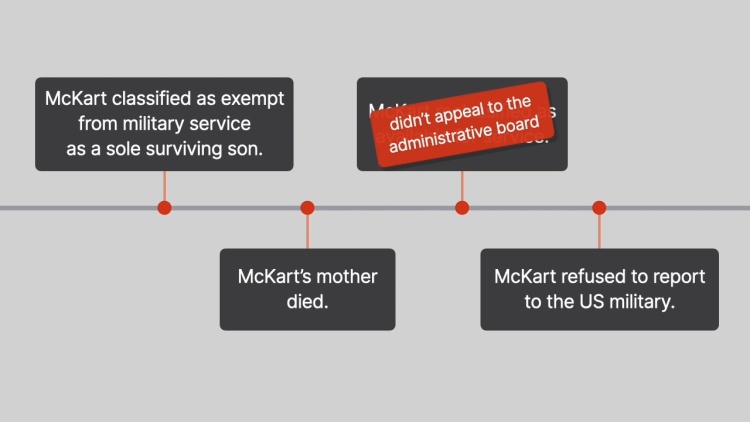McKart v. United States
United States Supreme Court
395 U.S. 185 (1969)
- Written by Kathryn Lohmeyer, JD
Facts
A Selective Service draft board classified Jack McKart (defendant) as exempt from military service under the Selective Service Act of 1948 (Act), 50 U.S.C. § 456(o), which provided an exemption for sole surviving sons of veterans who had been killed in action. The draft board later incorrectly reclassified McKart as immediately eligible to serve, and ordered McKart to report for a medical exam as part of his induction. Because McKart objected to the Vietnam War, he declined to appeal his reclassification to a state appeal board (board). At the time McKart was reclassified, draft registrants were not required to appeal their classifications to the board. After McKart failed to appear for his scheduled medical exam, he was federally charged and indicted for failing to report for service. McKart attempted to argue that he was exempt from service because his original classification had been correct. The district court ruled that McKart could not assert the exemption defense, because he had failed to exhaust his administrative remedies. McKart was convicted and sentenced to three years in prison. The court of appeals affirmed. The United States Supreme Court granted certiorari.
Rule of Law
Issue
Holding and Reasoning (Marshall, J.)
Concurrence (Douglas, J.)
Concurrence (White, J.)
What to do next…
Here's why 907,000 law students have relied on our case briefs:
- Written by law professors and practitioners, not other law students. 47,100 briefs, keyed to 996 casebooks. Top-notch customer support.
- The right amount of information, includes the facts, issues, rule of law, holding and reasoning, and any concurrences and dissents.
- Access in your classes, works on your mobile and tablet. Massive library of related video lessons and high quality multiple-choice questions.
- Easy to use, uniform format for every case brief. Written in plain English, not in legalese. Our briefs summarize and simplify; they don’t just repeat the court’s language.





